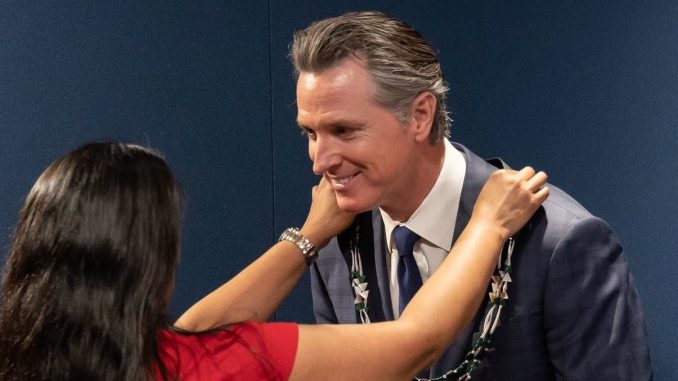
SACRAMENTO – Governor Gavin Newsom today announced $47 million in new funding for California tribal nations to support their efforts to prevent and end homelessness and meet the housing and services needs of their communities.
The awards include $20 million in tribal homeless assistance grants from the Business, Consumer Services and Housing Agency (BCSH) to fund projects in 16 tribal communities across the state, and four Homekey awards from the Department of Housing and Community Development (HCD) totaling $27 million to fund 75 homes for members of four tribes, including homeless youth.
“California is investing in getting people off the streets and into safe housing throughout the state with a particular focus on Native Americans and populations disproportionately impacted by homelessness,” said Governor Newsom.
The tribal grants program was created by Governor Newsom and the Legislature to provide flexible funding to support the efforts of California tribes to address homelessness in their communities. An additional $20 million in tribal grants will be awarded in 2023.
It’s unclear if the dozens of federally unrecognized Tribes in California — which are often the most marginalized and landless of California Indians — will have access to the funding.
“Tribal nations in California have been actively working to address housing insecurity, overcrowding and homelessness, but funding for housing and homelessness has often been an obstacle,” said BCSH Secretary Lourdes Castro Ramírez. “We heard that loud and clear through consultation and listening sessions held by our teams. We believe that these new direct resources will lead tribal leaders to move more quickly in meeting the unique challenges faced by members of their communities. We are committed to supporting the priorities laid out by tribal leaders and these grants will help address specific needs identified by the Tribal leadership. We look forward to expanding this partnership in the future.”
Political observers argue that Newsom is looking to deliver for indigenous communities in California. As he looks to appeal to 2024 Democrat Presidential Primary voters in ‘Red States’, they argue that Tribal communities could prove critical in combating the longstanding accusation that Newsom is a ‘coastal elite’ with limited appeal in the midsection of the country.
Political appeal in Indian Country would neutralize such a narrative.
California’s nation-leading Homekey program has been one of the state’s most successful innovations to rapidly house people experiencing homelessness, by public and tribal entities purchasing existing buildings or manufactured homes.
Since its inception, Homekey has funded more than 200 projects that when complete will provide more than 12,500 temporary and permanent homes for Californians experiencing or at risk of homelessness. More than 140 homes have been funded in partnership with tribes.
“HCD’s California Indian Assistance Program’s mission is to provide technical assistance to tribal partners to ensure access to housing funds and programs, including Homekey,” said HCD Director Gustavo Velasquez. “These four Homekey projects announced today are just the beginning–HCD will continue to collaborate directly with tribal communities and partners to meet their unique housing needs.”

Today’s announcement includes the following HHAP grants:
-
The Scotts Valley Band of Pomo Indians, Lakeport, will receive $5.2 million to create 65 housing units along with classrooms and support spaces for youth experiencing homelessness in Lake and Mendocino Counties.
-
The Cahto Tribe of Laytonville Rancheria will receive $2.6 million to create a wellness and resource center in Mendocino County.
-
The Round Valley Indian Tribes, Covelo, will receive $2.5 million to expand infrastructure to support new permanent housing for tribal members in need.
-
The Pit River Tribe, Burney, will receive $2.4 million to support rapid rehousing, services coordination and homelessness prevention efforts.
-
The Dry Creek Rancheria Band of Pomo Indians, Santa Rosa, will receive $1.2 million to improve data collection efforts and systems that serve tribal members experiencing homelessness statewide with designated service areas in Sonoma, Mendocino, Contra Costa and Lake Counties.
-
The Tolowa Di Nee’ Nation, Smith River, will receive $1 million to support rapid rehousing and case management for tribal members along the North Coast of California and South Coast of Oregon.
-
The San Pascual Band of Mission Indians, Valley Center, will receive $790,000 to assist tribal members experiencing homelessness.
-
The Chicken Ranch Rancheria of Me Wuk Indians, Jamestown, will receive $630,000 to support interim shelter and street outreach in Tuolumne County.
-
The Pala Band of Mission Indians will receive $610,000 to support housing efforts on the reservation.
-
The Kashia Band of Pomo Indians of the Stewarts Point Rancheria will receive $610,000 to support their transitional shelter.
-
The Yurok Tribe, Klamath, will receive $570,000 to assist with rapid rehousing, case management, outreach and youth engagement.
-
The Torres Martinez Desert Band of Cahuilla, Thermal, will receive $540,000 to support housing, shelter and services for members experiencing or at risk of homelessness.
-
The Wilton Rancheria, Elk Grove, will receive $460,000 to support efforts to assist tribal members experiencing homelessness.
-
The Bear River Band of Rohnerville Rancheria, Loleta, will receive $340,000 to aid with rapid rehousing and other services for members experiencing homelessness.
-
The Guideville Rancheria, Talmage, will receive $250,000 to leverage Homekey funding in the construction of 16 units for youth experiencing homelessness.
-
The Habematolel Pomo of Upper Lake will receive $250,000 to support housing efforts within the community.

In a speech before representatives of Native Americans in June 2019, Newsom apologized for the genocide of Native Americans approved and abetted by the California state government upon statehood in the 19th century. Tens of thousands of Native Californians were killed between 1849 and 1870 as a result of State-sanctioned violence.
Newsom said, “That’s what it was, a genocide. No other way to describe it. And that’s the way it needs to be described in the history books.






Be the first to comment